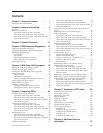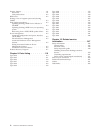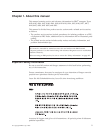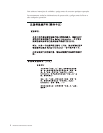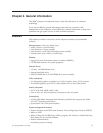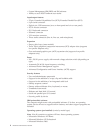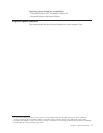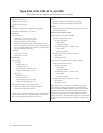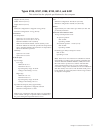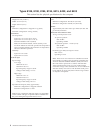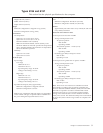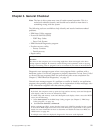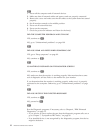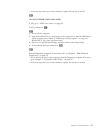
Types 8128, 8187, 8188, 8193, 8414, and 8431
This section lists the physical specifications for the computer.
Dimensions
Height: 140 mm (5.5 in.)
Width: 425 mm (16.7 in.)
Depth: 425 mm (16.7 in)
Weight
Minimum configuration as shipped: 10.0 kg (22 lb)
Maximum configuration: 11.4 kg (25.0 lb)
Environment
Air temperature:
System on: 10° to 35°C (50° to 95° F)
System off: 10° to 43°C (50° to 110° F)
Maximum altitude: 2134 m (7000 ft)
Note: The maximum altitude, 2134 m (7000 ft), is the
maximum altitude at which the specified air temperatures
apply. At higher altitudes, the maximum air temperatures
are lower than those specified.
Humidity:
System on: 8% to 80%
System off: 8% to 80%
Electrical
input
Input voltage:
Low range:
Minimum: 90 V ac
Maximum: 180 V ac
Input frequency range: 47–53 Hz
Voltage switch setting: 115 V ac
High range:
Minimum: 137 V ac
Maximum: 265 V ac
Input frequency range: 57–63 Hz
Voltage switch setting: 230 V ac
Input kilovolt-amperes (kVA) (approximate):
Minimum configuration as shipped: 0.08 kVA
Maximum configuration: 0.3 kVA
Note: Power consumption and heat output vary depending
on the number and type of optional features installed and
the power-management optional features in use.
Heat output (approximate) in British thermal units (Btu) per
hour:
Minimum configuration: 257 Btu/hr (75 watts)
Maximum configuration: 785 Btu/hr (230 watts)
Airflow
Approximately 0.51 cubic meters per minute (18 cubic feet
per minute) maximum
Acoustical
noise-emission values
Average sound-pressure levels:
At operator position:
Idle: 30 dBA
Operating: 32 dBA
At bystander position - 1 meter (3.3 ft):
Idle: 26 dBA
Operating: 30 dBA
Declared (upper limit) sound-power levels:
Idle: 4.0 bels
Operating: 4.3 bels
Note: These levels were measured in controlled acoustical
environments according to the procedures specified by the
American National Standards Institute (ANSI) S12.10 and
ISO 7779 and are reported in accordance with ISO 9296.
Actual sound-pressure levels in a given location might
exceed the average values stated because of room reflections
and other nearby noise sources. The declared sound-power
levels indicate an upper limit, below which a large number
of computers will operate.
Chapter 2. General information 7



